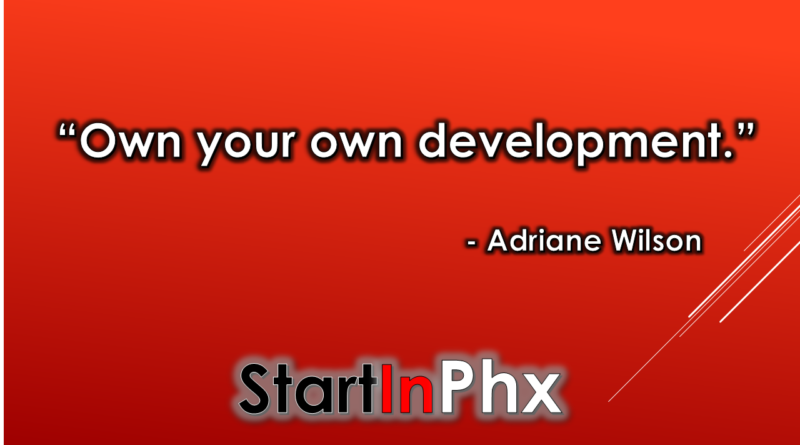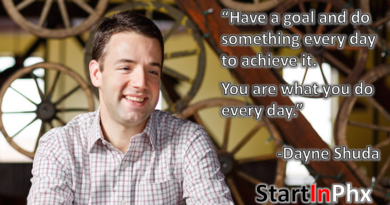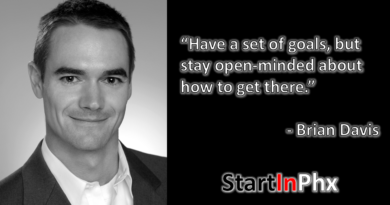From Journalism to a Career in Executive Coaching
 Adriane Wilson is the founder and president of Strengths Zone, an organization that specializes in Gallup-Certified Strengths Training and Executive Coaching.
Adriane Wilson is the founder and president of Strengths Zone, an organization that specializes in Gallup-Certified Strengths Training and Executive Coaching.
In this week’s Career Success Q&A, Adriane talks about which professional development fundamentals have allowed her to excel in journalism, sales, marketing, and as an entrepreneur. She also goes into depth on how she continues to overcome a professional hurdle she sees as one of the most stressful for professional women: moving cross country to pursue a new oppotunity.
Adriane and her team at Strengths Zone facilitate individual and group strengths-based development training for corporate, government, non-profit, and faith-based organizations nationwide. The training and coaching that Strengths Zone provides are all based in Gallup backed research and the Clifton StrengthsFinder assessment.
In not so many words, Adriane and her team help individuals identify what they do best. They do this so that professionals can focus on applying these strengths to achieve their greatest potential as an individual or as an asset to their organization.
Adriane began her career as a journalist with The Dallas Morning News. She was at one time a top sales director with Mary Kay reaching the $300,000 Circle of Achievement and the $500,000 Circle of Excellence.
In healthcare, Adriane spent a decade in Texas-based healthcare systems. Adriane held progressive, hospital-based roles as Marketing Director, Regional Marketing Director and as Vice President of Business Development.
Today, Adriane’s aim is to elevate employee engagement, leadership capacity and productivity using Strengths Based Development keys.
She is a frequent workshop speaker at National conferences and retreats. She is also an approved Executive Coach for the American College of Healthcare Executives (ACHE).
Past and current clients include AT&T Network National Centers, Lexus, Society for Healthcare Strategy and Market Development, SafeHaven of Tarrant County, INROADS/JP Morgan Chase Fellowship Program, Alpha Sigma Alpha National Convention & Leadership Conference and Leadership groups.
She earned a BA from the University of North Texas and MA from Stanford University.
Career Success Q&A
Do you have a mission statement or a guiding philosophy for your career?
Own your own development.
Often times we kind of sit back in our careers and wait on our managers or supervisors to suggest professional development training or workshops that could accelerate our careers.
I’m a big proponent of not waiting for your organization to tell you what you should be learning and what is trending. Take it upon yourself to always be learning and growing in your career.
Invest in yourself. Don’t sit back and wait for the organization to recognize that you have a lot of potential and room to grow, or that you’re interested in doing those things.
Step-one is to take inventory of where you are in your career and where you want to be. It is very crucial that you have a vision of where you are going, so that other people can help you, so that you can identify the proper resources to help you. So really, step-one is to map your future.
Live Tomorrow on Your Terms by Mapping Your Future Today
[FREE GUIDE] If you’ve been struggling to make it to the next level in your career, taking the first few steps to owning your own development can help you tear down the walls that stand in between you and the career you want to lead.
It’s free to download but this guide, 4 Steps to a More Fulfilling and Successful Career, will walk you through defining the true mission of your career, goals and benchmarks that will help you fulfill that mission, as well as a how to create an action plan that will ensure you can ‘check the box’ on each and everyone of them.
What excites you most about your career right now?
I’m excited about the variety, and [also] the ability to actually see people and teams transform in a positive way once they understand how they are wired.
Coaching is one part of my business and training is the other, both are based on the same effective tool.
In the individual coaching we get to unpack at a very precise level and understand the talents of the person and aim that at an individual goal or hurdle.
In group training we have the ability to talent map the DNA of a team or group, so that everyone on the team is using their specialty towards the overall success of the group.
In a team situation it isn’t as important for the individuals to be well rounded, but it is important that a group or company be well rounded.
One of the things that excites me about group training is the discovery of talent hiding in plain sight.
With the use of the StrengthsFinder tool, we are able to precisely identify the specialties that are represented in the existing organization.
What do you consider to be your greatest career accomplishment so far?
Having launched my own business.
I always wanted to have a career that paid me for thinking – that paid me for being a thinker – and I’m glad that my career really affords me that opportunity.
As a coach and a trainer I am continuously interpreting information from the [StrengthsFinder] assessment and connecting it with the well-being of individuals’ lives.
I think [wanting to be paid for thinking] comes from reading a lot and studying successful people. Just having a foundation in the necessity of being the best version of who you already are.
I think that probably came from a lot of mentoring along the way. I’d say I had mentors from age 16 on – from my high schools years on. Because of that, I feel an obligation to pay that forward. Being able to coach people and train people, based on an assessment – based on an actual tool, really allows me to do that.
How often do you read outside of work?
I get most of reading done while I travel, because my work is travel intensive. I always have a book for those unexpected flight delays and the flight itself.
Right now I’m reading The Year of Yes by Shonda Rhimes. Most of my reading is biographies, and a lot is really motivational. I love to read about the lives of successful people.
Shonda Rhimes is a T.V. producer. She’s the producer of Grey’s Anatomy, and I’m really enjoying that read.
Would you say reading has had a significant impact on your career?
I’d say reading has definitely had an impact.
I’d say [personal development] is a combination of three things. It’s a combination of the books that you read, the people you meet, and the places you go. A lot of development for me has been what I’m reading, who I’m meeting, and where I’m going.
If you were to stand up and look at your feet and understand that, except for the people you meet, the books that you read, and the places you’ll go, you could be in the same place next year, if you don’t develop that formula.
What books to you most frequently gift or recommend to others?
I love to see what’s on the A-list – what other people recommend. I love to see what’s on their list and build on that.
A book that I do recommend very often is, Dig Your Well Before You’re Thirsty. It’s about the importance of networking and being able to fill your well – your well being your connections with people and relationships that are positive – before you’re in a position to have to ask them for help.
I’ve found [Dig Your Well Before You’re Thirsty] to be helpful for people that are in career transition for the first time [after having worked a job for many years]. [Because] they realize that the landscape of how you land a job has changed drastically over the years.
[Dig Your Well Before You’re Thirsty] supports the notion that it’s really important to build relationships at times where you don’t need anything from anybody. It’s something I’ve picked up as a philosophy in the last few years.Something that predates [Dig Your Well Before You’re Thirsty] would be a classic one – Think and Grow Rich (Napoleon Hill). It’s something I’ve reread over the years.
Classic titles, [like Think and Grow Rich], are good to revisit because each time you read them you’re at a different point in your career and you’re at a different age and stage of life.
We are always evolving. No one stays the same. So, it is good to consider rereading some classic titles because something new may resonate with you for the very first time – totally based on the fact that you are at a different age and stage of life and business.
Is there one kind of media you consume most regularly as a means of continuing your on-going professional education?
I started as a journalist – I am a news junkie. I’m always tuned into the national networks – CNN, MSNBC, Fox News – I’m always tuned in at a national level. I certainly keep track of that online.
I love the technology we have in place now. I can get breaking news alerts on my phone or on my watch. I like the immediacy that we have now. I’m very much a national news addict.
I have the CNN app, I really like that because I get the breaking news alerts 24 hours.
The 24 hour news cycle is real. We are no longer living in a world where you come home and sit down to watch the 6 o’clock news. I’m very appreciative of apps and the CNN app is the one I go to quite a bit – well it comes to me now.
What role has mentorship had in your professional development?
Mentorship has made all the difference in my career.
I was taken under the wings of a group of journalist in my high school years and they have tracked my career since then. I’ve even had the opportunity to hire them for various projects.
Mentorship has taught me a lot about the unspoken rules in the workplace and professionalism and the importance of paying it forward.
In fact, I am still in contact with quite a few and I’m still always learning from them. Now I’m at a place where I share as well – [as a peer].
You never get too old for advice, and good advice is even better!
Some of the hallmarks of an outstanding mentor would be – number one – they have an ability to see your blind spots. Secondly, I’d say they give you authentic feedback. Third, I’d say they have a knack for understanding the unspoken rules of different business cultures.
Those are the things you can’t get from a college education. There are no specific classes on those areas, but they are quite critical to success.
Some business cultures are very verbally expressive. They are filled with people who are heavy talkers – heavy communicators verbally. There are others that are very introverted. If you’re not really clear on that you might present as a fish out of water, because you’re not using the same communication style that company has attained large measures of success with.
Some culture are heavy on email, others are heavy on face-to-face, and that is largely based on who is at helm of the ship.
But it could take you six months to a year to really know what the expectations are [without mentorship].
Do all of the people you consider to be your mentors know you hold them in that regard?
Most people do know, because I still describe them as that. And I like to introduce them as [my mentor].
Do you actively mentor other professionals?
Yes, in variety of industries and people in variety of ages.
People have come to know my style as one that is quite neutral. As in – I have an eye of objectivity for situations that allows me to share sound guidance.
Most people tend to call their mentor when they are in crisis. That tends to be time when you’d need advice. When you are in crisis you can be highly emotional, and [may] not really have the ability to process circumstances and information accurately.
A mentor can actually remove a lot of the emotional factors and strip down a situation to its basic pillars in a way that people cannot when they are in crisis.
What has been the biggest challenge you’ve had to overcome in your career, so far?
One of the biggest challenges has been moving from one state to another – not just one city to another. Moving is a very stressful process for women. I think I read somewhere that it is one of their top 3 stresses.
I [moved] and stated a business in a state where I had no [business] connections. The way that I continue to overcome that was by networking quite strategically, and meeting people. It’s absolutely became a necessity to meet new people every week, and to really take interest in what they are doing.
First and foremost – take interest in them. It’s a matter of really meeting people – new business people and peers when you have 100 other things on your list of things to do that come with the process of moving.
It’s everything from starting as a new member of a chamber [of commerce], to learning were every FedEx office is, to having to use your GPS every time you leave home, to having to introduce yourself everywhere you go, to going to meetings and networking events where you might not know a soul in the room.
I think what triggered me [to be so strategic] was knowing that I had to be very clear on who my customers are. All business owners need to know – in refined clarity – who their ideal client is.
I found that there was such a necessity to step out of my comfort zone in order to be in the rooms with people I could actually help – and decision makers – and that has made a tremendous difference.
[There is] a difference between being busy and going out to network to be really productive.When you say that going backwards is not an option, your only option is moving forward. I think that came out of wanting to stay in the entrepreneurial lane, and knowing [entrepreneurship] was the best life for me to be in. Going backwards would not be an option.
[Another] part of my story is that getting laid-off isn’t always the worst thing in the world. I used [being laid-off] as the window to spread my wings and launch a business and in the long-run that has been very rewarding. Had it not been for losing my job, I might still be in the same place.
What have you found to work really well for fostering your own professional growth?
Knowing my own strengths has been the best professional development process yet. Because, prior to that I was guessing quite a bit. Now that I am very clear on what I naturally do well, it has eliminated a lot of frustration.
Would you consider yourself a goal-setter?
I set monthly goals and quarterly goals and annual goals and long-term plans as well. I think that is very much a part of tracking and measuring your successes.
When you write [goals] down you are more committed to what is happening.
One of the talents that describes me is called ’achiever.’ That is a reflection of my natural drive to get things done. I like to check the box. I think that is serving me well [in pursuing goals]. You can count on me to get things done and to have thoroughly thought about it at the same time.
Need Help Setting and Achieving Your Career Goals?
[FREE GUIDE] Don’t just set goals, create a plan so that your goals are actually achieved this time.
While you’re at it, you might also want to make sure the goals you’re working so hard to achieve are in service of whatever purpose makes the career you pursue worth while.
It’s free to download, but this guide, 4 Steps to a More Fulfilling and Successful Career, was designed to help you create real opportunities to ‘check the box’ on career milestones that have been just out of reach for too long. It will help you to define your career’s purpose, goals that are worth your time, and an action plan that will turn your goals into achievements.
Has writing or journaling had an impact your life or career?
As a formal journalist I find journaling to be quite powerful. I really like to look back on my writing from a year ago or years-past to see the growth and to have a good understanding on how learning is just part of the process.
Generally speaking, people are not going to think the same way at 25 years old as they did at 35 years old. I think it is a positive thing to write journals, because it is an easy way to actually compare ways you use to think and how your mind has evolved with experience.
If you could, what advice would you give your younger self?
The advice I would have given my younger self would have been – don’t be afraid to give yourself opportunities that don’t already exist.
I had in my mind, a career in online newspapers before they even existed. But, because that career and that title didn’t exist yet – it wasn’t available – I didn’t quite know how to matriculate that. I didn’t know how to create a job that was ahead of the technology.
Looking back, I probably would have done that differently. I probably would have been more of a pioneer instead of saying – Well, that job doesn’t exist yet I guess I’ll do something else.
Now if I have an idea that is something unique or innovative, I do as much research as I can and surround myself with people who can be helpful.

What is the best way for people to connect with you?
LinkedIn: https://www.linkedin.com/in/adriane-wilson-929a1814
Have questions about your own professional development or the details of Adriane’s career success?
Ask your questions in the comments below and we’ll be sure to help in anyway we can!
You can receive articles like this as well as other great content we suggest from around the internet directly to your inbox by subscribing to our weekly newsletter #StartTuesday.





Awesome article! Thank you for sharing your insight and experiences. Very encouraging and motivating.
Thanks Tiffany! We’re glad you liked it!